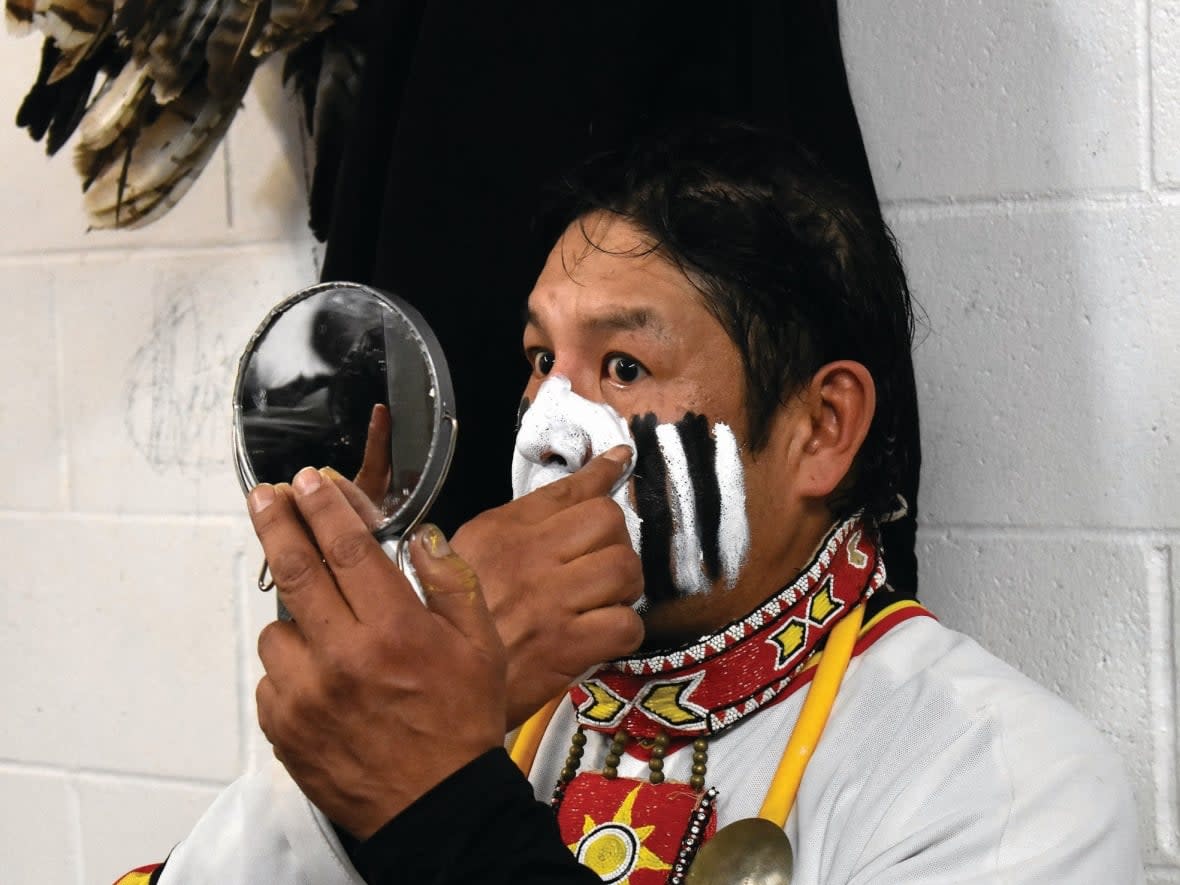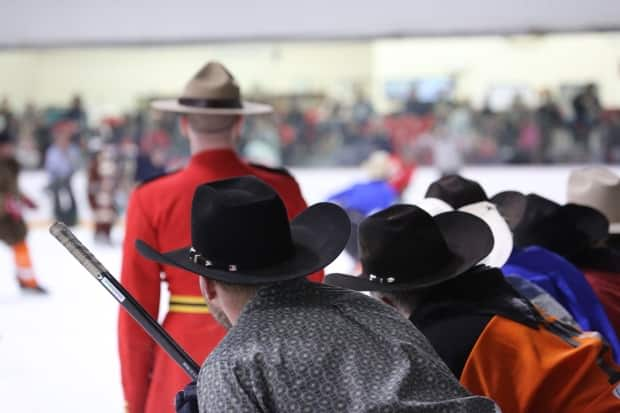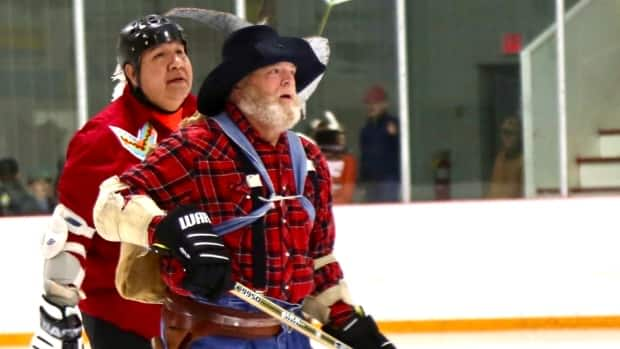Cowboys and Cree hockey players face off in 40th edition of the Battle of the Little Big Puck

Hundreds of people will jam into a hockey rink in Maple Creek, Sask., on Saturday night to watch rodeo cowboys face off against their Cree neighbours in a long-standing charity hockey game dubbed the "Battle of the Little Big Puck."
It's the 40th edition of what the town near the Alberta border calls "an epic hockey game" between members of the Nekaneet First Nation, located just south of Maple Creek, and local cowboys who are current or former rodeo competitors.
In the third period, players trade their hockey gear for traditional wear. The cowboys play in their chaps, cowboy hats, plaid shirts and, sometimes, even spurs on their skates. The First Nations players wear headdresses, animal hide and face paint. The referees are RCMP officers who change into their red serge.
"We're just neighbours. That's all we really are," said Nekaneet Chief Alvin Francis, who played in the first game in 1979 and continued on until he hung up his skates about 10 years ago.

He said outsiders may raise an eyebrow at the teams calling themselves "Cowboys" and "Indians," but he believes people who take the time to learn about the community — and the history and spirit of the game — come to realize it's about mutual respect, unity and friendship.
"I understand it's politically incorrect … but they consider themselves cowboys and we consider ourselves the old term of 'Indians,' which today is First Nations, right? So that's the way we look at it," Francis told CBC News. "We can laugh at each other and make jokes with each other — just to be neighbours — because that's the way the world is supposed to be. That's how we see it."
Every year, the game raises thousands of dollars for the local health centre, youth activities or people in need. This year, part of the proceeds will help Sandy Cooper, a teenage bronco rider who was paralyzed at a recent rodeo.
So how did it all begin?
It was 1978. Three friends stopped for a beer on a hot summer day.
Tom Reardon, now 75, hatched the plan with another local cowboy, Nick Demchenko, and their buddy, Raymond Anderson, a member of the Nekaneet First Nation.
"It took more than one beer to plan it," joked Reardon. "All we were doing was planning a fun Sunday afternoon. We weren't visionaries or anything like that."

Reardon came up with the game's name, Battle of the Little Big Puck, inspired by the Battle of the Little Bighorn in 1876.
"I went into the bathroom at the bar, there, and while I was there, that entered my mind. I came out and Nick and Raymond had a mouthful of beer when I said that, and it splattered all over the table."
The cowboys and Cree players faced off in their first game in January 1979, raising $180 for the local hospital, then staged a rematch in 1980.
"It was tied. Each team had won a game. We just thought, 'Well, that's good,' " said Reardon.

A few years later, some community members decided to resurrect the idea. They printed tickets and turned it into a community event that has flourished for decades.
"The purpose of it really is the fellowship," said Reardon. "It's a fun time!"
A sense of community
For some, the game has developed a deeper meaning and symbolism.
The Nekaneet First Nation has a unique history in southwest Saskatchewan. In the late 1800s, many First Nations were pushed out of the Cypress Hills and moved onto reserves in other parts of the province. But one chief — Chief Nekaneet — refused to go.
His people stayed in the area without reserve land or federal funding, made friends with the settlers, farmed and learned to rodeo. The Nekaneet First Nation was granted reserve status in 1913, but those relationships carried on.
Today, the Battle of the Little Big Puck reflects that history.

"Generation on generation, that's passed down. That knowledge and that respect is passed down, right from the beginning. You don't see that in other communities," said Maple Creek Mayor Michelle McKenzie.
The 51-year-old woman remembers going to the game when she was 14. At the time, she was a bit unsure of where she fit in as a Métis girl in the community. The hockey game helped her find a sense of belonging, she said.
"It didn't matter who you were or what you were or the skin colour you were, you were still included in part of the community. So that really hits home for myself, being able to figure out where I belong," said McKenzie.

Elder Larry Oakes will strap on his skates for Saturday's game, just as he has for almost all the other games. The 63-year-old former chief of Nekaneet First Nation said everyone plays hard, even though it doesn't really matter who wins.
"In order to deal with something like racism or discrimination, people have to be doing something. It's not just something that you just write about or talk about. You better be doing something. This is something that we can say we're doing together," he said.
In the final minute of the hockey game, all the players will flood onto the ice together, as the standing-room-only crowd cheers.
The Cree elder says, "It's a celebration."



